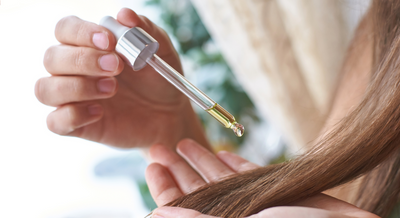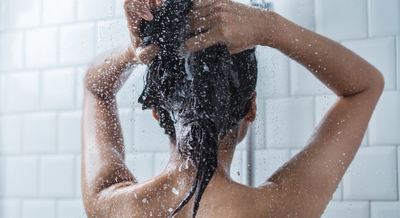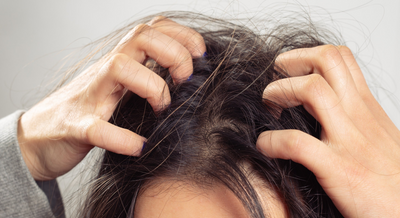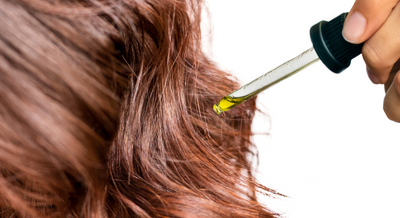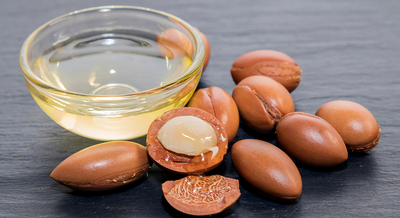Unless you’ve been living under a rock, you know the importance of incorporating a sunscreen into your skincare routine. Over time, exposure to the sun causes the degradation of collagen in the skin, which accelerates the process of skin aging and the formation of wrinkles.
Additionally, excessive overexposure can produce sunspots and inflammatory marks on the skin, not to mention the potential for sun burning and worse, increasing the chances of developing skin cancer. Simply put, few things are more essential to an effective skincare routine than sunscreen.
With all this in mind, it might surprise you to learn that sunscreen has recently become popular as a hair care product as well.
The hair care market has seen a massive influx of sunscreen products, with numerous treatment products being designed to effectively deliver SPF protection to the hair and scalp.
If you’re wondering what the benefits of hair sunscreen are and whether a hair sunscreen is right for you, read our guide below!
The Dangers of UV Exposure to the Hair
We’ve described the effects that overexposure of the sun can have on your skin, but what about your hair? Unless you wear a hat or head covering, the scalp is one of the most vulnerable places on your body when it comes to sun exposure. Unfortunately, this exposure from the sun’s UV rays can have quite a damaging effect on the hair and scalp.
Color Fading
Much like a strong bleach, the sun’s UV waves can cause some serious fading to your hair’s natural color. While darker hair tones have slightly better resistance to sun-induced color fading, those with dirty-blonde or light red hair can experience a noticeable lightening of color tone. This is especially problematic for those with color-treated hair, as the sun can dramatically accelerate the fading of hair dye.
Hair Breakage
Excessive sun exposure can cause induce significant hair damage, leading to breakage and loss of hair density. You see, excessive sun exposure can lead to excessive dryness in the hair shaft, which causes hair to become weak and brittle. Additionally, UV radiation can degrade the outer cuticle layer and destroy the hair’s natural proteins, which prevents the hair from maintaining moisture and elasticity.
Scalp Damage
Despite being covered in a layer of hair, your scalp is just as susceptible to sun damage as your face is. This is especially true if you have thin, light-colored hair, as this hair type absorbs far less sun radiation than thick, dark-colored hair. This excessive sun exposure can cause severe dryness and irritation on the scalp, leading to conditions such as flaking and inflammation. Should these conditions worsen, the hair follicle can be potentially compromised, leading to hair thinning and hair loss.
Accelerated Signs of Aging
Much like with your face, the sun also causes increased signs of aging in your hair. As the sun degrades the hair’s natural proteins, the hair shaft loses structure, while the hair follicle loses its ability to effectively induce hair growth. As a result, signs of aging can become apparent, such as loss of hair thickness and early balding and hair loss. This can even cause the hair to gray prematurely, due to the degrading of natural proteins in the hair that maintain hair color.
Hair Sunscreen to the Rescue
Thankfully, the market has been graced with the release of numerous hair sunscreen products to help prevent the damaging effects listed above. Thanks to sunscreen, the hair and scalp are afforded a protective layer from the sun’s UV waves, providing enormous anti-aging and hair and scalp benefits.
How Does Sunscreen Work?
We know that sunscreen prevents the sun’s waves from damaging the skin and hair, but how exactly does it work? When it comes to sunscreen, there are two types: physical and chemical. Physical sunscreen, containing ingredients such as zinc oxide and titanium oxide, can coat the hair and skin in a protective layer of fine minerals that repel the sun’s waves. Chemical sunscreens, containing ingredients such as Avobenzone and Octinoxate, work by absorbing the sun’s waves and preventing UV radiation from reaching the hair and skin. While each category has its own pros and cons, many sunscreens incorporate physical and chemical SPF ingredients for a full-spectrum range of coverage.
Additionally, there are numerous natural ingredients that possess inherent SPF properties. Coconut oil, for instance, contains a natural SPF of 8, making it an excellent option for any leave-in hair care product. Similarly, shea butter has a natural SPF of 6-10, making it both a protective and intensely moisturizing ingredient to incorporate in your hair care arsenal.
How to Apply Hair Sunscreen
Hair and scalp sunscreens come in many forms, such as sprays, powders, and leave-in conditioners. These products are best applied after washing or rinsing the hair, allowing the sunscreen to properly coat and penetrate the hair strand and scalp. Work the product down the hair strand and into the scalp for full, even application and coverage.
Depending on your hair type, you may find certain products more appropriate and useful than others. Those with naturally oily hair may prefer a powder or lightweight sunscreen for their hair, as some sunscreens may exacerbate the hair’s greasy, oily state. For those with dry, thin hair, a rich, moisturizing sunscreen product can be the perfect 2-in-1 product to provide both effective sun coverage and rejuvenating moisture. Additionally, those with darker hair colors may want to opt for a chemical sunscreen instead of a physical sunscreen. Ingredients like zinc oxide, which are common in physical sunscreens, are notorious for leaving a white cast upon application. While some sunscreens use micronized, microscopic versions of zinc oxide that prevent this negative effect, it may be best to stay on the safe side and pick a chemical sunscreen to prevent any noticeable white marks.



